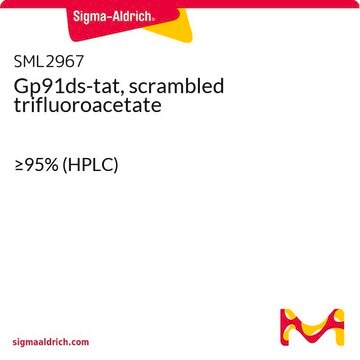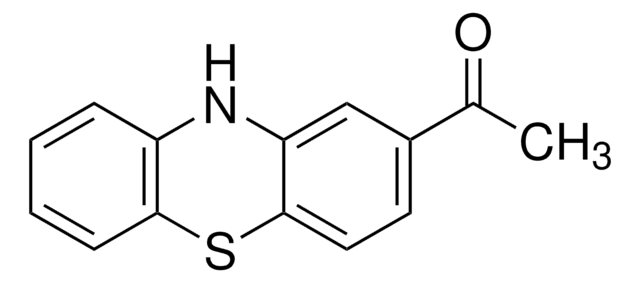178385
Apocynin
≥98% (GC), powder, NADPH oxidase inhibitor, Calbiochem®
Synonym(s):
Apocynin, 4-Hydroxy-3-methoxyacetophenone, Acetovanillone, NADPH Oxidase Inhibitor V, NOX Inhibitor V
About This Item
Recommended Products
product name
Apocynin, A cell-permeable, anti-inflammatory phenolic compound that acts as a potent and selective inhibitor of NADPH oxidase.
Quality Level
Assay
≥98% (GC)
form
powder
manufacturer/tradename
Calbiochem®
storage condition
OK to freeze
protect from light
color
white to off-white
solubility
DMSO: 10 mg/mL
ethanol: 20 mg/mL
shipped in
ambient
storage temp.
−20°C
InChI
1S/C9H10O3/c1-6(10)7-3-4-8(11)9(5-7)12-2/h3-5,11H,1-2H3
InChI key
DFYRUELUNQRZTB-UHFFFAOYSA-N
General description
Biochem/physiol Actions
NADPH oxidase
Packaging
Warning
Reconstitution
Other Notes
Muijsers, R.B., et al. 2000. Br. J. Pharmacol.130, 932.
Lapperre, T.S., et al. 1999. FEBS Lett.443, 235.
Supinski, G., et al. 1999, J. Appl. Physiol.87, 776.
van der Goes, A., et al. 1998. J. Neuroimmunol.92, 67.
Hart, B.A., and Simmons, J.M. 1992. Biotechnol. Ther.3, 3.
Legal Information
Signal Word
Warning
Hazard Statements
Precautionary Statements
Hazard Classifications
Eye Irrit. 2 - Skin Irrit. 2 - STOT SE 3
Target Organs
Respiratory system
Storage Class Code
11 - Combustible Solids
WGK
WGK 2
Certificates of Analysis (COA)
Search for Certificates of Analysis (COA) by entering the products Lot/Batch Number. Lot and Batch Numbers can be found on a product’s label following the words ‘Lot’ or ‘Batch’.
Already Own This Product?
Find documentation for the products that you have recently purchased in the Document Library.
Customers Also Viewed
Our team of scientists has experience in all areas of research including Life Science, Material Science, Chemical Synthesis, Chromatography, Analytical and many others.
Contact Technical Service










